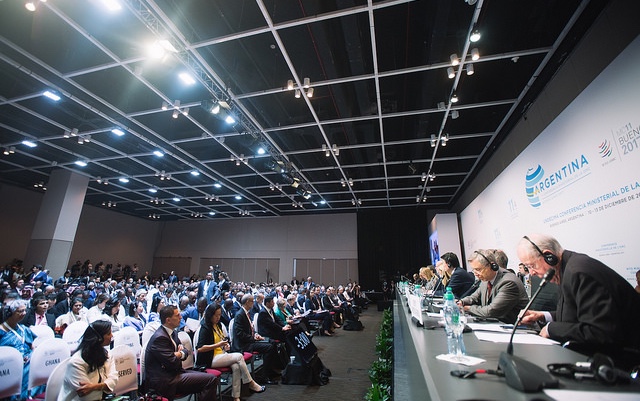Since 2001, global agricultural trade has grown by almost 200 percent, with much of this expansion happening in developing countries. The Southern Cone countries—Argentina, Brazil, Paraguay, and Uruguay—have become the world’s largest net food exporters and thus have an increasingly important role to play in the global agricultural trading system. At the same time, and partially in response to the growing position of developing country trade, political and economic trends in some developed countries have become increasingly populist and protectionist. These disparate trends can pose major challenges for international negotiations.
The Eleventh World Trade Organization (WTO) Ministerial Conference, now underway in Buenos Aires, marks the first time that the event takes place in a South American country and presents a unique opportunity for Southern Cone countries to emphasize their trade interests and perspectives. Agricultural Trade Interests and Challenges at the WTO Ministerial in Buenos Aires: A Southern Cone Perspective, a new book, examines some of the main themes of the conference, focusing on the WTO’s Agreement on Agriculture (AoA) and its potential impact on the Southern Cone.
Several major themes remain unresolved by the WTO and hold particular importance for Southern Cone countries, the book explains:
- Domestic support programs (including farm subsidies and public stockholding programs for domestic food security purposes)
- Market access (including the special safeguard mechanism for developing countries and tariffs)
- Export competition (including compliance with the elimination of export subsidies on agricultural products agreed upon at the Tenth WTO Ministerial held in Nairobi in 2015)
The book also focuses on two topics that have yet to be seriously debated by WTO members: the elimination of export restrictions on food products and the inclusion of environmental disciplines in future WTO decisions.
While the diverging perspectives of developed and developing countries regarding many of these issues pose a challenge to the successful completion of the WTO Ministerial, the changing global trade landscape has provided the Southern Cone and other developing countries with increased power in WTO negotiations, as well as in other international trade contexts. From this perspective, the book argues that developing countries should view the conference with some optimism and should use it as an opportunity to define their new role.
That is no easy task. The expansion of protectionist policies, together with the uncertainties brought about by structural unemployment, global migration, and increasing regional and global conflict, pose significant obstacles to trade negotiations. Given these problems, the book argues that developing countries should work to protect and build on gains from past negotiations.
In particular, they should continue to push for stronger WTO trade rules and disciplinary actions, and for the organization to exercise its role as an arbiter in trade disputes. Multilateral trade agreements can help developing countries protect their interests in the face of protectionist policies in developed countries and can help ensure free and fair trade.
Developing countries should also be mindful of the present global political context, which includes both protectionist trends and expanded opportunities for up-and-coming global players. This is especially important for net food-exporting countries, including the Southern Cone. For example, trade will likely play a major role in achieving the SDGs’ food security targets; this new context could help bring together net food importers and net food exporters in new ways.
As with any trade negotiation, finding the correct balance between countries’ political constraints and their desired goals will be crucial in determining the success of the WTO Ministerial. In order to strike such a balance, WTO member countries should truly commit themselves to the multilateral system, and to the WTO in particular, in order to ensure that both developing and developed countries can benefit from an increasingly globalized, rapidly changing world.
Sara Gustafson is a Communications Specialist and Valeria Piñeiro is a Senior Research Coordinator with IFPRI’s Markets, Trade and Institutions Division.
Agricultural Trade Interests and Challenges at the WTO Ministerial in Buenos Aires: A Southern Cone Perspective is a collaboration between IFPRI and the Group of Producing Countries from the Southern Cone (GPS), the Institute for International Agricultural Negotiations Foundation (INAI), the Buenos Aires Grain Exchange, the International Centre for Trade and Sustainable Development (ICTSD), and the Inter-American Institute for Cooperation on Agriculture (IICA).







